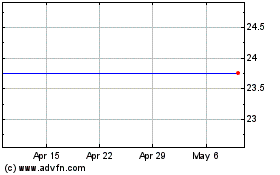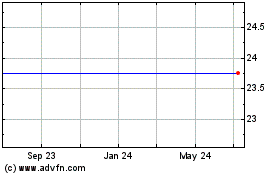Avast Software to Buy AVG Technologies for $1.3 Billion -- Update
July 07 2016 - 5:27PM
Dow Jones News
By Robert McMillan
Czech antivirus-software maker Avast Software s.r.o agreed to
pay $1.3 billion to acquire rival AVG Technologies NV, part of a
wave of mergers in computer security.
The deal comes less than a month after antivirus pioneer
Symantec Corp. agreed to pay $4.65 billion for cyberdefense vendor
Blue Coat Systems Inc.
Industry players expect more deals, as larger players with
established revenue streams look to build out their product lines
to take on a new generation of cyberthreats.
"What you see happening here is you see a number of old-guard
companies trying to find ways to consolidate and buy new
technologies and get access to growth in new markets," said Matt
Miller, a partner with venture-capital firm Sequoia Capital.
Companies are spending more for computer security, following a
rash of data breaches in recent years. Research firm Gartner Inc.
expects world-wide security spending to increase almost 10% this
year, to $91.6 billion.
Historically, though, large security companies have struggled to
develop breakthrough products, said Jeremiah Grossman, chief of
security strategy with Sentinel One Inc., a three-year-old security
startup that competes with Avast and Symantec.
Symantec's Blue Coat acquisition gave the antivirus company new
cloud-computing capabilities, as did Cisco Systems Inc.'s 2015
acquisition of OpenDNS, valued at $635 million. Last month, the
Financial Times reported that Intel Corp. is considering the sale
of its Intel Security business, which produces McAfee antivirus
software. Intel declined to comment on Thursday.
With the acquisition of Netherlands-based AVG, Avast gets more
scale to compete with larger security companies such as
Symantec.
"We are in a rapidly changing industry, and this acquisition
gives us the breadth and technological depth to be the security
provider of choice for our current and future customers," Vince
Steckler, Avast's chief executive, said in a statement.
Avast agreed to pay $25 a share for AVG, in cash. The price
represented a 33% premium over AVG's closing price on
Wednesday.
Venture dollars flowing into cybersecurity startups more than
tripled between 2011 and 2015, to $3.8 billion last year, according
to data from CB Insights.
Mr. Miller and other investors believe that with corporate
valuations cooling, the next months are likely to bring more
acquisitions. "The big companies realize that the prices have
somewhat come down, and it may be a good time for consolidation,"
he said.
Valuations of publicly traded security companies have dropped
significantly over the past year, when measured as a multiple of
their annual sales, said Brent Thill, an analyst with UBS Group AG.
UBS tracks 11 cybersecurity companies, including Palo Alto Networks
Inc., Fortinet Inc. and Check Point Software Technologies Inc. One
year ago, these companies were trading on average at nine times
their annual sales. As of June 30, that multiple had fallen to
4.6.
"The smaller companies say, 'If we were to go it alone our
valuation would not be the same, and so their more open to the
discussion as well, '" Mr. Miller said.
Joanne Chiu contributed to this article.
Write to Robert McMillan at Robert.Mcmillan@wsj.com
(END) Dow Jones Newswires
July 07, 2016 17:12 ET (21:12 GMT)
Copyright (c) 2016 Dow Jones & Company, Inc.
Symantec (NASDAQ:SYMC)
Historical Stock Chart
From Mar 2024 to Apr 2024

Symantec (NASDAQ:SYMC)
Historical Stock Chart
From Apr 2023 to Apr 2024
